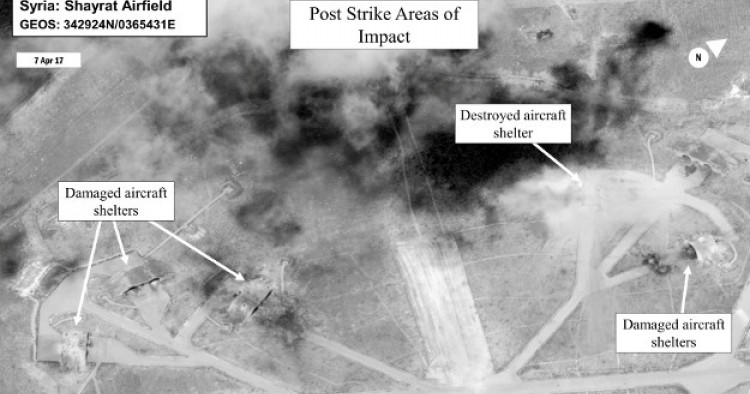In this week's Monday Briefing, MEI experts Paul Salem, Randa Slim, Charles Lister, Gonul Tol, and Alex Vatanka provide analysis on recent and upcoming events including the need for an overarching strategy in Syria following U.S. airstrikes, Secretary of State Tillerson's upcoming visit to Moscow, the likely aftermath of U.S. airstrikes in Syria, Turkey's growing frustration with U.S. strategy in Syria, and the rise of a hardliner challenger to Rouhani in the upcoming Iranian presidential election.
Airstrikes in Search of a Strategy
Paul Salem, Vice President for Policy and Research
The U.S. strikes in Syria have already had significant effects, but they still leave the questions of overall Syria strategy hanging. On the immediate side, the attacks provide a tangible deterrent to future use of banned chemical weapons. They have also signaled to America’s friends and foes that this administration is open to taking quick military action. But the reversal of the administration’s own course on Syria—Bashar al-Assad was not seen as a central problem or priority days before the attack—and the inconsistent messaging from administration officials since the strikes have left an air of confusion as to Trump’s future policy on Syria.
If the strikes are indeed a one-off, as a U.S. defense official pointed out, then this would suggest that there is no real strategy to remove Assad, or at the very least pressure him to compromise. While U.S. ambassador to the UN Nikki Haley touted the possibility of “regime change,” Secretary of State Rex Tillerson emphasized “defeat(ing) ISIS” and “stabilizing” parts of Syria outside of regime control.
Defeating ISIS and al-Qaeda, removing Assad and stabilizing Syria are, however, not separate objectives, but rather intrinsically linked. Overcoming jihadist terrorism in Syria cannot be achieved without addressing the core factor that fueled its rise in the first place: the brutal and corrupt rule of the Assad regime.
Trump is good at impulsive and dramatic actions that dominate the news cycle. What is needed now, however, is a long overdue Syria policy.
Tillerson in for Testy Meeting with Russians
Randa Slim, Director of the Initiative for Track II Dialogues
U.S. Secretary of State Rex Tillerson heads to Moscow this week to meet with senior Russian officials, for what’s likely to be a testy meeting after the U.S. strike on a Syrian airbase last week. Despite the blustery rhetoric and hollow show of force of sending frigates to the eastern Mediterranean, Moscow’s response has been measured. They did not cancel the meeting with Tillerson, and it is possible the Russians were displeased by the regime’s chemical attack on Khan Sheikhoun. Bashar al-Assad has proven to be a difficult and at times embarrassing ally, but he remains Russia’s only trump card as it seeks to project power in the Middle East.
Tillerson’s visit comes as the Trump administration projects an unclear Syria policy. On Sunday, senior officials, including Tillerson and national security advisor H.R. McMaster, argued the United States is prepared for more military action in Syria if needed. American objectives in Syria are “defeating ISIS” and seeking “a significant change in the nature of the Assad regime and its behavior in particular.”
For years, the Obama administration tried unsuccessfully to change Assad’s calculus and behavior, but the Trump administration seems to be pursuing this same objective in Syria. They are betting that because of their willingness to use military force, they might succeed where the previous administration failed. It is still not clear how they will leverage their limited use of force to extract a political solution in Syria. Russian officials will grill Tillerson about this plan, but it is not clear he has one.
U.S Strike on Syria: Too Little, Too Late
Charles Lister, Senior Fellow
Much of Syria’s opposition have publicly praised the punitive strikes conducted last week against al-Shayrat airbase as a sign of stronger American leadership, but jihadists affiliated with al-Qaeda perceive a greater U.S. role in Syria with great trepidation. The mainstream opposition’s greatest frustration is that it has taken over six years for the international community to act even minimally to punish flagrant war crimes. With nearly 500,000 dead and 11.5 million displaced, some see this latest development as too little too late.
With opposition Syrians expressing some concern that the targeted action may have been an exception rather than a new norm, jihadists’ fallback option has been to insist that it undoubtedly is a one-off symbolic gesture. That Syrian aircraft are reported to have continued operations from al-Shayrat within hours has gone some way toward justifying that hardline position, as has the Assad regime and Russia’s continued conventional and indiscriminate bombing of civilian areas and their reported use of both chlorine gas and thermite incendiary munitions.
Four days later, U.S. military action appears to have generated no new discernible strategy, while messaging by Trump administration officials has been more contradictory than consistent. Nevertheless, strategic change may also result from how U.S. allies neighboring Syria respond to U.S. escalation. Turkey has resumed armed supplies to select groups in northern Syria in coordination with Qatar, and has re-embraced a stridently anti-Assad tone in recent days. Jordan is rumored to be preparing cross-border operations against ISIS-linked groups in Syria’s south, to be conducted in coordination with moderate opposition factions, while Israel’s cooperative relationship with Russia appears to be on a downward trajectory. Such developments are likely to catalyze a more active U.S. role in opposition operations, whether that was originally planned or not.
Turkey Hopes for Greater U.S. Role in Syria
Gonul Tol, Director of the Center for Turkish Studies
Despite Ankara’s repeated statements that Turkey’s military incursion into Syria would not end without the capture of Manbij, Operation Euphrates Shield ended without winning control of town. One of the aims of the operation was to become an actor on the ground, and provide an alternative force to Syrian Kurdish militias for Washington.
Ankara hoped that by intervening militarily, it could prove that Washington did not need the Kurds in the upcoming fight to recapture Raqqa, and instead work with Turkish-backed forces in the fight against ISIS. That has not happened. The United States seems to have decided to keep working with the Syrian Kurdish Y.P.G. militia to recapture Raqqa.
Unable to shift the dynamics on the ground in Syria on the eve of a historic referendum on President Recep Tayyip Erdogan’s long-time dream to switch to a presidential system, Ankara ended its military incursion.
President Donald Trump’s recent strike on Syria comes against this background. After having failed to convince the Obama administration to pursue a more assertive policy and establish a no-fly zone in northern Syria, Turkey is now hoping that last week’s strike might signal a more forceful U.S. policy in Syria. Erdogan hailed the U.S. attack as a positive development, but said it was not enough on its own and "serious steps" were needed to protect the Syrian people—hinting at the no-fly-zone. But Ankara is likely to be disappointed again since early signs from the Trump administration indicate that last week’s strike was a “one-off” and does not signal a dramatic change in US policy.
Prominent Hardliner Declares Candidacy for Iranian Presidential Election
Alex Vatanka, Senior Fellow
President Hassan Rouhani’s re-election is suddenly in question. On April 9, 57-year-old hardliner Ebrahim Raisi, and loyalist of Iran’s Supreme Leader Ayatollah Ali Khamenei, officially entered the presidential race. Raisi will likely become the unity candidate of the dozen “principlist” (hardline) parties that have been deeply divided. Still, Raisi’s electability is still a big unknown test since he has never run for top-level political office.
Even as a unity candidate for the hardliners, he would almost certainly lose at the ballot box to Rouhani. But the fear in the Rouhani camp is that a combined effort from the Office of the Supreme Leader, the top brass of the Revolutionary Guards and elements of the security and intelligence services will parachute Raisi into the presidency. Once he captures the presidency, Raisi is in a good position to take over as supreme leader from the 77-year-old Khamenei.
While this theory seems straightforward on paper, the implementation of such a strategy is hardly risk-free. For Raisi to win in May, Khamenei and his cohorts would need to initiate a major destabilization campaign against the Rouhani government and the entire moderate/reformist camp, which will likely involve large-scale rigging of the vote.
Since the stakes are so high, and Rouhani is showing no signs of backing down, the stage is set for much political arm-wrestling in the weeks to come. For Khamenei, the gamble on Raisi might be worth it, but he has surely not forgotten the lessons of the 2009 Green revolution, when he last opted to engineer the result of a presidential election.
The Middle East Institute (MEI) is an independent, non-partisan, non-for-profit, educational organization. It does not engage in advocacy and its scholars’ opinions are their own. MEI welcomes financial donations, but retains sole editorial control over its work and its publications reflect only the authors’ views. For a listing of MEI donors, please click here.


















